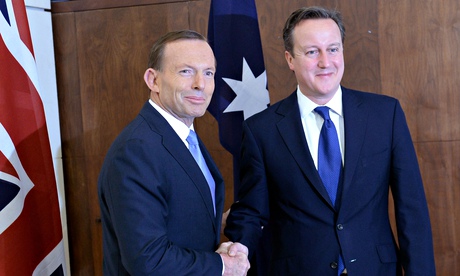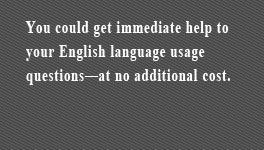Which English? One that promotes understanding between countries and cultures
The Guardian March 14, 2014

Finding the right words to communicate effectively to a global audience is much more important than whether you put an 'ise' or 'ize' on the end


For readers unfamiliar with them, the man on the left is Tony Abbott, prime minister of Australia, and the man on the right is David Cameron, prime minister of the United Kingdom. Photograph: Stefan Rousseau/PA
As the Guardian discusses the most effective ways to write for a global audience that includes readers of different varieties of English, a lot of emphasis is being placed on the differences between adherence to "British English", "Australian English", or "American English".
But more important than spelling or differences in grammar is that we all think about writing in a way that makes our work comprehensible and accessible to the broadest potential audience, rather than saying "We're in New York/Sydney, so we'll do it our way - London, you do it yours."
We have a global site with tremendous reach and surely any Guardian writer wants to get maximum mileage for his/her piece. The reporter in Sydney should be considering that a British person reading about the Queensland anti-bikie laws will probably know where Queensland is, but a US reader might not. But the writer obviously doesn't want to alienate the local readership by writing "in the Australian state of Queensland". So, find a subtle way of getting "Australia" into the mix in the opening pars - maybe by a prominent early mention of a statutory authority that includes "Australia", or something else that makes things clear.
This is often just a matter of tweaking, and helps to settle the reader into a story that might contain some unfamiliar names and places. "Tony Abbott said ... " in one sentence, followed in the next sentence by "The prime minister added ... ". On the other hand, a Guardian US reporter can probably get away with just naming an individual state or a prominent politician without having to explain it's got to do with America.
In terms of style and grammar, "Obama met Putin on Tuesday" is understood by everyone, with no loss of meaning despite the fact that an American writer might leave the preposition out. "Obama met Putin Tuesday" is potentially jarring for a significant part of the audience, I feel, and might make those readers less likely to continue with the story.
There are other tricks, like writing "two and a half miles" instead of 2.5 miles - the former is broader, not as formal and makes you dwell less on the fact that you might live in a metric jurisdiction, and you are more likely to plough on with reading rather than pull up and try and perform some mental arithmetic. The aim is to draw as many people as possible into the content and have them feel comfortable reading it right through.
I really do think if we work thoughtfully we can weed out a great deal of localised, exclusive language, without having to bleed the writing of all colour or get too wound up about whether it's "realise" or "realize" in an individual piece. It seems a very Guardian thing to do: presenting our work in a way that promotes understanding between countries and cultures, with Americans reading important Australian stories that they might not otherwise hear about - while we also capitalise on Brits' and Australians' mutual and enduring fascination with each other.
I worked in Canada for a good while and I thought the Canadian Press stylebook did a fairly good job of treading a middle ground between "American" and "British" English in newswriting - it's worth a look. I'm sceptical about the idea that the AP stylebook should be accepted as a benchmark for how "US English" should be accommodated at the Guardian.
When I started working at the Guardian and the Observer in London I found the newswriting quite wordy compared with the copy I was used to handling, and thought it could have done with being a good deal more terse. After a while I realised that the style of writing was important to getting across the subtlety and nuance in the topics we cover, the way we cover them. I'm concerned that when we decide to deviate from our established style to fit in with "local differences" we risk losing some of that, as well as the differentiation that attracts people to the Guardian. However, with careful thought, and by thinking about the whole audience that exists for everything we write, I reckon we can arrive at the right international mix.
 +7 (495) 969-87-46
+7 (495) 969-87-46


















